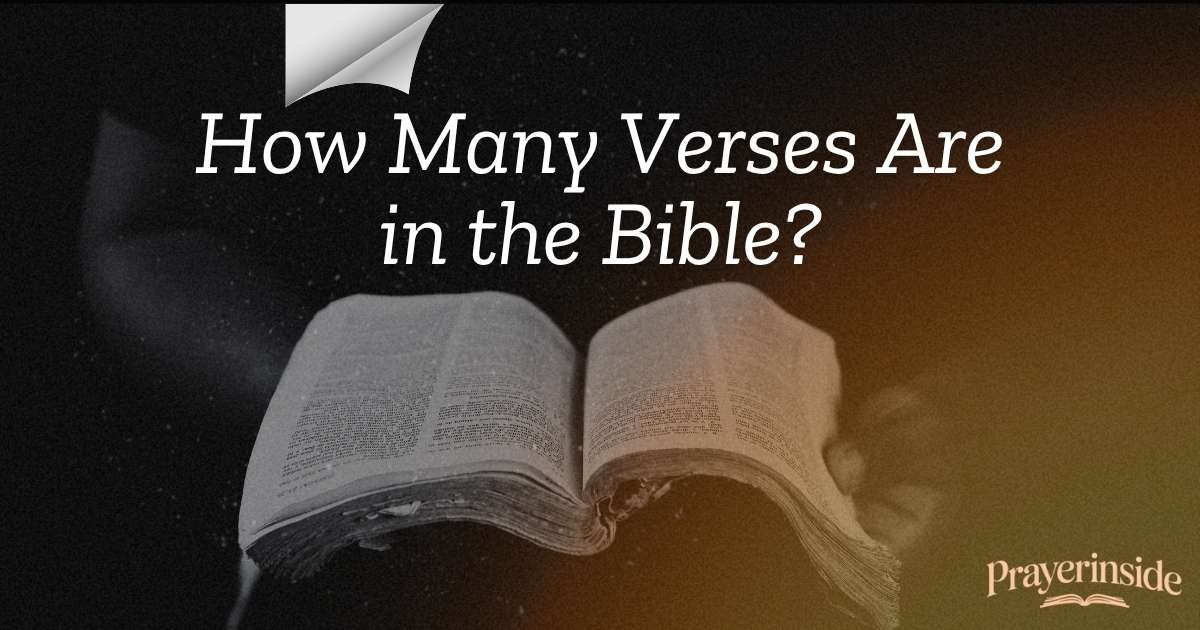Have you ever wondered How Many Verses in the Bible? Whether you’re reading for devotion, study, or curiosity, this question opens the door to a fascinating journey through one of the most influential books in human history. The Bible isn’t just a collection of words, it’s a divine library of faith, wisdom, and truth.
In this article, we’ll look closely at the number of verses in the Bible, how the Bible was divided into chapters and verses, and why these divisions matter for believers today. Along the way, we’ll also explore key facts, translation differences, and what this structure reveals about God’s Word.
Understanding the Bible’s Structure
Before diving into numbers, let’s look at how the Bible is organized.
The Bible is divided into two main sections:
- The Old Testament – 39 books (in Protestant Bibles) that record creation, God’s covenant with Israel, prophecies, and history.
- The New Testament – 27 books that focus on the life, ministry, death, and resurrection of Jesus Christ, and the growth of the early church.
Together, these 66 books form the complete Christian Bible used by most Protestant denominations.
But within these books, we find chapters and verses a system that helps readers find specific passages quickly.
Who Divided the Bible into Chapters and Verses?
When the Bible was originally written, How Many Verses in the Bible it didn’t include chapter or verse divisions. Ancient Hebrew scrolls of the Old Testament and early Greek manuscripts of the New Testament were written as continuous text.
The Development of Chapters
Around 1227 AD, Stephen Langton, an English Archbishop of Canterbury, divided the Bible into the chapters we use today. His chapter divisions made studying and referencing Scripture much easier.
The Development of Verses
Later, in 1551, Robert Estienne, a French printer and scholar (also known as Stephanus), added verse numbers to the New Testament. He used these divisions in his printed Greek New Testament, which soon influenced all major Bible translations.
So, the chapter and verse system we use today is a man-made tool, not part of the original inspired text. Still, it helps millions of believers read, memorize, and study God’s Word efficiently.
How Many Verses Are in the Bible?

The number of verses depends on the Bible translation and textual tradition (Hebrew, Greek, or Latin manuscripts). Here’s a general breakdown:
| Bible Version | Total Books | Total Chapters | Total Verses |
| King James Version (KJV) | 66 | 1,189 | 31,102 |
| New International Version (NIV) | 66 | 1,189 | Around 31,173 |
| English Standard Version (ESV) | 66 | 1,189 | Around 31,103 |
| New American Standard Bible (NASB) | 66 | 1,189 | Around 31,173 |
| Catholic Bible (with Apocrypha) | 73 | 1,334 | Around 35,526 |
| Hebrew Tanakh | 24 | N/A | Around 23,145 |
So, the Protestant Bible (used by most Christians) contains 31,102 verses in total.
- Old Testament: 23,145 verses
- New Testament: 7,957 verses
The Longest and Shortest Verses in the Bible
The Shortest Verse
- John 11:35 – “Jesus wept.”
Just two words, yet incredibly powerful. This verse shows the deep compassion of Jesus Christ and reminds us that He shares in our sorrows.
The Longest Verse
- Esther 8:9 (KJV) – This verse has 90 words!
It records a royal decree written during the time of Esther, reflecting the detailed style of Old Testament narrative.
How Many Chapters and Words Are in the Bible?
Besides verses, readers often wonder about chapters and total word counts.
| Bible Version | Chapters | Words (Approx.) |
| King James Version (KJV) | 1,189 | 783,137 |
| New International Version (NIV) | 1,189 | 727,969 |
| English Standard Version (ESV) | 1,189 | 757,439 |
The longest chapter is Psalm 119, with 176 verses, focused on the beauty of God’s law.
The shortest chapter is Psalm 117, with only two verses, yet it calls all nations to praise the Lord.
Verse Counts by Bible Book (KJV)
Here’s a quick overview of how many verses each book has in the King James Version:
| Book | Verses |
| Genesis | 1,533 |
| Exodus | 1,213 |
| Leviticus | 859 |
| Numbers | 1,288 |
| Deuteronomy | 959 |
| Psalms | 2,461 |
| Proverbs | 915 |
| Isaiah | 1,292 |
| Matthew | 1,071 |
| John | 879 |
| Romans | 433 |
| Revelation | 404 |
…and many more. Each book adds its own voice to the story of God’s redemption, from Creation to Eternal Life.
Why Do Verse Numbers Matter?

At first glance, counting verses might seem purely academic. But understanding the structure of the Bible helps in many ways:
- Easy navigation: Verse numbers make finding passages simple, whether in sermons, study, or personal devotion.
- Memorization: Short verse segments help believers memorize and recall Scripture.
- Teaching and study: Pastors, teachers, and students can cite specific portions for clarity.
- Unity: Verse divisions allow Christians across the world to read the same passage together, no matter the translation.
Still, it’s important to remember that God’s Word is not about numbers, it’s about transformation. The Holy Spirit speaks through every verse to bring faith, hope, and salvation.
Interesting Facts About Bible Verses
- The middle verse in the KJV Bible is Psalm 118:8 — “It is better to trust in the Lord than to put confidence in man.”
It perfectly captures the message of faith and trust. - The longest word in the Bible is Mahershalalhashbaz (Isaiah 8:1), the name of a prophet’s son.
- The word “God” appears over 4,300 times in the KJV.
- The word “Lord” appears more than 7,000 times.
- There are 31,102 verses—that means if you read one verse per day, you could finish the Bible in 85 years!
Translations and Variations in Verse Count
Different Bible translations have slight variations in verse counts due to translation philosophy and ancient manuscript differences.
For example:
- Some verses in the KJV (like Matthew 17:21 or Mark 9:44) are omitted or footnoted in modern translations like the NIV because earlier Greek manuscripts didn’t include them.
- Catholic and Orthodox Bibles include Deuterocanonical books such as Tobit and Maccabees, which add several hundred verses.
These differences don’t change the overall message or doctrine of the Christian faith, they simply reflect the history of how the Scriptures were preserved and transmitted.
Spiritual Reflection: Why Every Verse Matters
Each verse in the Bible—no matter how small—carries divine truth. From Genesis 1:1 (“In the beginning, God created the heavens and the earth”) to Revelation 22:21 (“The grace of the Lord Jesus be with God’s people. Amen.”), every line tells a part of God’s story.
Some verses comfort us in pain, others challenge us to grow. Some reveal God’s promises, others show His justice and mercy.
But all verses lead us toward salvation, faith, and spiritual growth.
How to Read and Remember Bible Verses
Here are some practical tips for studying verses effectively:
- Pray before reading. Ask the Holy Spirit to guide your understanding.
- Read slowly. Don’t rush—pause to reflect on what God is saying.
- Take notes. Keep a faith journal or use Bible study guides.
- Memorize key verses. Start with short ones like Philippians 4:4 or John 11:35.
- Join a Bible study group. Learning in community brings new insight.
- Apply the verses. Scripture isn’t just for reading—it’s for living.
Top 10 Most Loved Verses in the Bible

These are some of the most quoted and beloved verses across the world:
- John 3:16 – “For God so loved the world…”
- Psalm 23:1 – “The Lord is my shepherd…”
- Philippians 4:13 – “I can do all things through Christ…”
- Romans 8:28 – “All things work together for good…”
- Proverbs 3:5-6 – “Trust in the Lord with all your heart…”
- Jeremiah 29:11 – “For I know the plans I have for you…”
- Psalm 46:1 – “God is our refuge and strength…”
- Matthew 5:9 – “Blessed are the peacemakers…”
- Romans 12:12 – “Rejoice in hope; be patient in tribulation…”
- Hebrews 11:1 – “Faith is the substance of things hoped for…”
Each verse holds timeless power. Whether you need encouragement, forgiveness, or wisdom, these verses bring you closer to God’s heart.
The Bigger Picture: Beyond Counting Verses
Knowing how many verses are in the Bible is fascinating, but it’s not about the number, it’s about the message.
Every verse reveals something about:
- God the Father’s love and justice,
- Jesus Christ’s sacrifice and redemption, and
- The Holy Spirit’s guidance and peace.
The Bible is alive and active (Hebrews 4:12). Its verses teach us to trust, forgive, love, and live with purpose.
As Psalm 119:105 says:
“Your word is a lamp to my feet and a light to my path.”
The number of verses might be measurable, but their impact is infinite.
Also Read : Bible Verses About Joy That Remind You of God’s Love in Every Season
Conclusion
So, how many verses are in the Bible?
In the King James Version, there are 31,102 verses each one inspired, powerful, and purposeful.
From Genesis to Revelation, these verses form a story of love, grace, and redemption. The more you read, the more you’ll find that the Bible isn’t just a book, it’s a living word that transforms lives.
Whether you’re counting verses, studying chapters, or meditating on a single Bible verse, remember this:
Every word points to Jesus Christ, the true Word made flesh (John 1:14).

